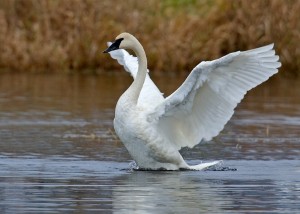A Boggy Notion
Fifty-five newly conserved acres on Long Beach Peninsula expand an anchor habitat that supports a unique blend of coastal, wetland, and forest ecosystems.
We’re pleased to announce the conservation of 55 acres in the interior of Long Beach Peninsula in Pacific County, Washington.
The conserved wetland property builds on 750 acres Columbia Land Trust has conserved along Island Lake and Loomis Lake directly north, in addition to 460 acres of habitat managed by Washington State Parks and the Washington Department of Fish & Wildlife. The area is comprised of interdunal lakes and freshwater wetlands, a unique environment of national significance for migratory shorebirds and waterfowl, including trumpeter swans (Cygnus buccinator).
Together, these 1,265 acres form an anchor habitat, a healthy swath of lands and waters vital to maintaining broader ecosystem functions in the region. The Land Trust’s Conservation Agenda identifies conserving and restoring the last remaining interdunal wetland habitats as a core 25-year objective for the Coast Range & Estuaries ecoregion.
This complex of lakes and marshes between rows of dunes supply the peninsula’s aquifer with freshwater crucial for nearby communities and cranberry farms, while also providing vital habitat for a diversity of species, such as elk, bear, amphibians, and a wide variety of birds. Moreover, conservation efforts in the middle of the peninsula help preserve open space and scenic value cherished by residents and visitors. The looming prospect of second home development in this coastal destination drives a sense of urgency around bolstering this anchor habitat while it’s still possible.
While the site primarily features healthy wetland habitat, Columbia Land Trust’s stewardship team will work to remove junk, treat weeds, and plant trees in the coming months.
The Land Trust purchased the property from private landowners, Benjamin Leahu, Rachel Huffaker Leahu, and Rachel’s late father, Fernando Medina. We extend our thanks to the landowners to our funding partners, The Washington Department of Ecology and the United States Fish & Wildlife Service’s National Coastal Wetlands Grants Program, for making this latest conservation success possible.
